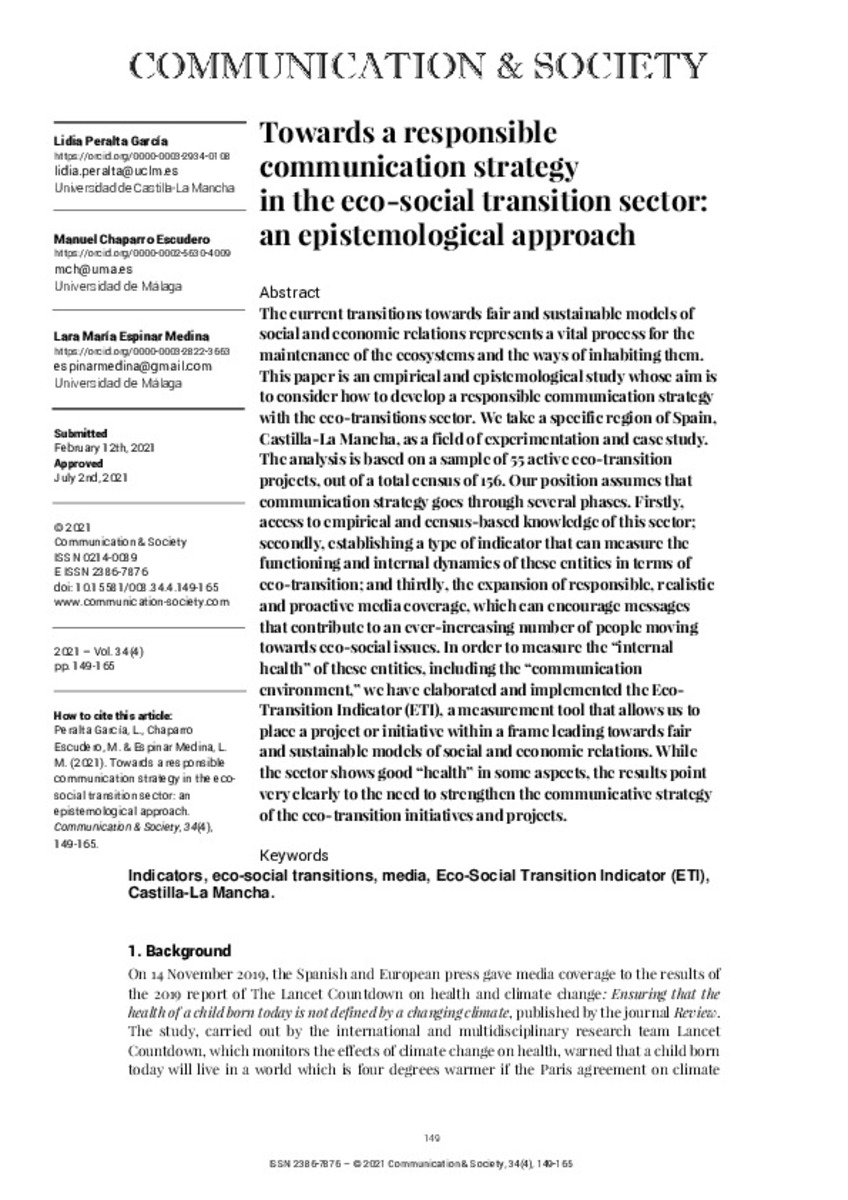Full metadata record
| DC Field | Value | Language |
|---|---|---|
| dc.creator | Peralta-García, L. (Lidia) | - |
| dc.creator | Chaparro-Escudero, M. (Manuel) | - |
| dc.creator | Espinar-Medina, L.M. (Lara María) | - |
| dc.date.accessioned | 2021-10-04 | - |
| dc.date.accessioned | 2021-10-20T11:19:59Z | - |
| dc.date.available | 2021-10-20T11:19:59Z | - |
| dc.date.issued | 2021 | - |
| dc.identifier.citation | Peralta-García, L. (Lidia); Chaparro-Escudero, M. (Manuel); Espinar-Medina, L.M. (Lara María). "Towards a responsible communication strategy in the eco-social transition sector: an epistemological and applied degrowth approach". Communication & Society. 34 (4), 2021, 149 - 165 | es |
| dc.identifier.issn | 2386-7876 | - |
| dc.identifier.uri | https://hdl.handle.net/10171/62212 | - |
| dc.description.abstract | The current transitions towards fair and sustainable models of social and economic relations represents a vital process for the maintenance of the ecosystems and the ways of inhabiting them. This paper is an empirical and epistemological study whose aim is to consider how to develop a responsible communication strategy with the eco-transitions sector. We take a specific region of Spain, Castilla-La Mancha, as a field of experimentation and case study. The analysis is based on a sample of 55 active eco-transition projects, out of a total census of 156. Our position assumes that communication strategy goes through several phases. Firstly, access to empirical and census-based knowledge of this sector; secondly, establishing a type of indicator that can measure the functioning and internal dynamics of these entities in terms of eco-transition; and thirdly, the expansion of responsible, realistic and proactive media coverage, which can encourage messages that contribute to an ever-increasing number of people moving towards eco-social issues. In order to measure the “internal health” of these entities, including the “communication environment,” we have elaborated and implemented the Eco-Transition Indicator (ETI), a measurement tool that allows us to place a project or initiative within a frame leading towards fair and sustainable models of social and economic relations. While the sector shows good “health” in some aspects, the results point very clearly to the need to strengthen the communicative strategy of the eco-transition initiatives and projects. | en_US |
| dc.language.iso | eng | - |
| dc.publisher | Servicio de Publicaciones de la Universidad de Navarra | es_ES |
| dc.rights | info:eu-repo/semantics/openAccess | es_ES |
| dc.title | Towards a responsible communication strategy in the eco-social transition sector: an epistemological and applied degrowth approach | en_US |
| dc.type | info:eu-repo/semantics/article | es_ES |
| dc.identifier.doi | 10.15581/003.34.4.149-165 | - |
| dadun.citation.endingPage | 165 | - |
| dadun.citation.number | 4 | - |
| dadun.citation.publicationName | Communication & Society | - |
| dadun.citation.startingPage | 149 | - |
| dadun.citation.volume | 34 | - |
Files in This Item:
Statistics and impact
Items in Dadun are protected by copyright, with all rights reserved, unless otherwise indicated.






